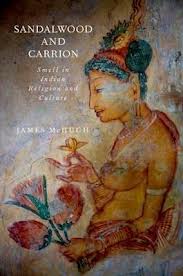Sandalwood & Carrion: Smell in Indian Religion & Culture by James McHugh {New Book - Fragrant Readings}

James McHugh did his PhD in Indian and Sanskrit Studies at Harvard University - where we first heard about his research - and is currently an assistant professor at the University of Southern California. He is interested in the intersection of systems of religious and philosophical thoughts and the aromatic culture of South Asia saying that "I try to show a variety of ways in which the study of smell and aromatics can elucidate our understanding of South Asian religions." Yet, far from simply instrumentalizing olfactory traditions to serve an epistemological purpose in the study of religions, he is by all reports truly interested in the sense of smell. Not content to delve into ancient texts, he has also collaborated with contemporary French perfumer Christophe Laudamiel (here) - a former teaching fellow at Harvard University - to create several illustrative perfumes to his dissertation "and one stink", which have now been archived at the university...
Laudamiel has signed numerous personal and ambient perfumes. He is well-known for his work on the illustrative coffret of scents to Perfume: the Story of a Murderer.
Sandalwood and Carrion: Smell in Indian Religion and Culture was published by Oxford University Press in September 2012 and is based on the author's dissertation work. We'll have occasion to review the book. For now, here is what we learn from the publishing house,
"James McHugh offers the first comprehensive examination of the concepts and practices related to smell in pre-modern India. Drawing on a wide range of textual sources, from poetry to medical texts, he shows the deeply significant religious and cultural role of smell in India throughout the first millennium CE.
McHugh describes sophisticated arts of perfumery, developed in temples, monasteries, and courts, which were connected to a worldwide ocean trade. He shows that various religious discourses on the purpose of life emphasized the pleasures of the senses, including olfactory experience, as a valid end in themselves. Fragrances and stenches were analogous to certain values, aesthetic or ethical, and in a system where karmic results often had a sensory impact-where evil literally stank-the ethical and aesthetic became difficult to distinguish.
Sandalwood and Carrion explores smell in pre-modern India from many perspectives, covering such topics as philosophical accounts of smell perception, odors in literature, the history of perfumery in India, the significance of sandalwood in Buddhism, and the divine offering of perfume to the gods.
Via press release









